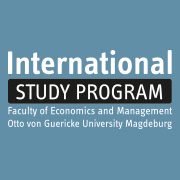EPA at a Glance
1. Enjoy a Unique Learning Experience
Dive into a one-of-a-kind, research-oriented master’s program in Economic Policy Analysis. This program empowers students to independently tackle intricate economic challenges using both theoretical and empirical methodologies. Stand out with a distinct skill set that’s in high demand in the global economic landscape.
2. Take Advantage of Pioneering Research
With its Center of Evidence-Based Policy Analysis - CEPA, its MaXLab Laboratory for Economic Research, and its close ties to the Halle Institute for Economic Research (IWH), Otto von Guericke University Magdeburg is a first-class hub for economic research. By joining this program, students can engage with leading experts in different fields and learn and benefit first-hand from their research.
3. Learn the Toolbox of Economic Researchers and Experts
The curriculum is designed to offer a comprehensive understanding of economic policies in diverse areas like trade, labor, environment, financial, and social policy. Students will master evidence-based policy analysis techniques and learn behavioral economic methods, including hands-on laboratory experiments.
| Study Program: | Economics Policy Analysis |
| Degree: | Master of Science (M.Sc.) |
| Duration: | 4 semesters, full-time study program |
| Language: |
English & up to 4 modules in German may be taken |
| Type: | Research, strong theoretically orientation |
| Class: |
Currently about 15 students from ca. 5 countries |
| Internationality: | Mix of lecturers, the content of modules, study abroad options |
| Collaboration: |  |
| Tuition: | Subsidized by the German government for all students |
| Admission: | Documents + Requirements |
| Special requirements: | |
| GPA: | from 1.0 up to 2.9 only (German grading scale) |
| Modules: | Overview of classes: Program Structure |
| Credits: | ECTS 120, including master's thesis |
| Regulations: | Study- and Examination Regulations |
| Begin: | Winter semester only (October) |
| Internships: | Not integrated in the study program |
| Accreditation: | OVGU self accrediation; study program talks annually |
This research-oriented master's program conveys the necessary skills for students to analyze complex economic problems, issues, and policy solutions on their own, with the help of advanced empirical methods, analytical research skills, and theoretical models.
The policy-oriented program focuses on theoretical and empirical analyses of economic policy measures in different areas, such as trade, the environment, the labor market, and social policy. Tools studied and applied for this purpose include both traditional theoretical analyses, advanced empirical methods for evidence-based policy analysis, and behavioral economic analyses, such as laboratory experiments.
Get a brief Overview of the English programs at our school.
